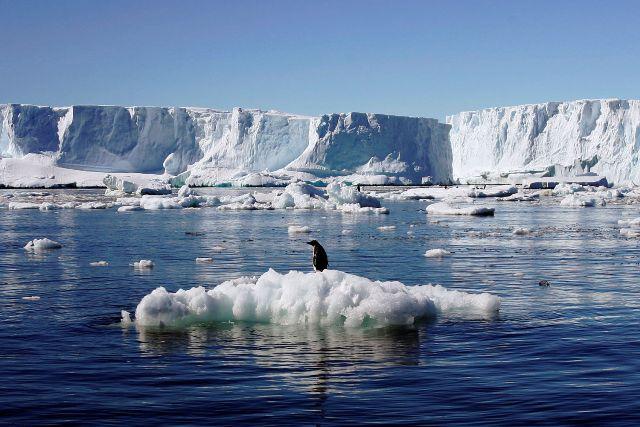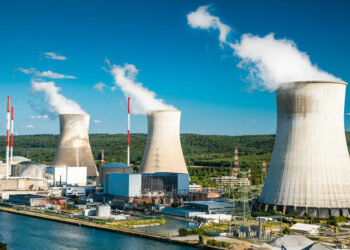Global warming has slightly slowed the Earth’s rotation — and it could affect how we measure time.
A study published Wednesday found that the melting of polar ice — an accelerating trend driven primarily by human-caused climate change — has caused the Earth to spin less quickly than it would otherwise.
The author of the study, Duncan Agnew, a geophysicist at the Scripps Institution of Oceanography at the University of California San Diego, said that as ice at the poles melts, it changes where the Earth’s mass is concentrated. The change, in turn, affects the planet’s angular velocity.
Agnew compared the dynamic to a figure skater twirling on ice: “If you have a skater who starts spinning, if she lowers her arms or stretches out her legs, she will slow down,” he said. But if a skater’s arms are drawn inward, the skater will twirl faster.
Less solid ice at the poles, then, means more mass around the equator — Earth’s waist.
“What you’re doing with the ice melt is you’re taking water that’s frozen solid in places like Antarctica and Greenland, and that frozen water is melting, and you move the fluids to other places on the planet,” said Thomas Herring, a professor of geophysics at the Massachusetts Institute of Technology who was not involved in the new study. “The water flows off towards the equator.”
The study suggests, in other words, that human influence has monkeyed with a force that scholars, stargazers and scientists have puzzled over for millennia — something long considered a constant that was out of humanity’s control.
“It’s kind of impressive, even to me, we’ve done something that measurably changes how fast the Earth rotates,” Agnew said. “Things are happening that are unprecedented.”
His study, which was published in the journal Nature, suggests that climate change is playing a significant enough role in the Earth’s rotation to counteract an opposing trend. Because of a combination of factors, the Earth has begun to spin faster in recent decades, a temporary trend that has prompted scientists for the first time to consider subtracting a single “negative leap second” from clocks worldwide as soon as 2026. But the melting of polar ice has delayed that possibility by about three years, according to Agnew.
If timekeeping organizations do eventually decide to add a negative leap second, the adjustment could disrupt computer networks.
The reason leap second adjustments have historically been needed is that even without climate change, Earth’s daily rotation has trended slower over millions of years, even though it may seem constant.
About 70 million years ago, days were shorter and lasted roughly 23.5 hours, a study in Paleoceanography and Paleoclimatology suggests. That means Cretaceous dinosaurs experienced a planet with 372 days in each year.
Several key factors affect the planet’s spin — sometimes working in opposition.
The friction of ocean tides, due in part to the moon’s gravitational pull, slows the Earth’s rotation. Meanwhile, since the last Ice Age, the Earth’s crust has been uplifting in some regions as it responds to the removal of ice sheets’ weight. That effect shifts where mass is distributed and speeds up the planet’s spin. Both of those processes are fairly constant and have predictable rates.
Yet another factor is the movement of fluid within the Earth’s liquid inner core — a wild card that can either speed or slow how fast the Earth rotates, Agnew said. Fluctuations in Earth’s core are a primary reason that the planet has rotated faster than would be otherwise expected in recent decades.
That faster spin has led timekeepers to consider — for the first time since Coordinated Universal Time was officially adopted in the 1960s — whether it might make sense to subtract a leap second to keep universal time in lockstep with Earth’s rotation.
But polar ice melt is counteracting that trend and has forestalled any decision point about whether to add a negative leap second. According to Agnew’s estimates, it has delayed that possibility from 2026 to 2029 — if the current pace of Earth’s rotation holds.
As climate change intensifies, researchers expect ice melt to have an even more profound effect on how the planet spins.
“It will have a bigger contribution as time goes on and as melt accelerates, as we expect it’s likely to do,” Herring said. He added that the new study was a thorough, solid analysis that combined research from several disciplines of science.
The need for timekeepers to adjust universal time to stay in line with the Earth’s rotation is not a new phenomenon. But historically, that has involved adding leap seconds to the common standard for clocks when Earth’s slowing spin causes astronomical time to fall behind atomic time (which is measured by the vibration of atoms in atomic clocks).
Adding or subtracting leap seconds is a pain, because they have the potential to disrupt satellite, financial and energy transmission systems that rely on extremely precise timing. Because of that, global timekeepers voted in 2022 to do away with the leap second additions and subtractions by 2035 and let universal time drift away from the pace of the Earth’s rotation.
“There’s been a push since about 2000 to get rid of leap seconds,” Agnew said.
Regardless of whether clocks wind up changing, the notion that melting polar ice is affecting the Earth’s rotation speaks to how significant an issue it has become. Research has already described the profound impact that ice loss will have on coastal communities.
Scientists expect sea level rise to accelerate as the climate warms, a process that will continue for hundreds of years. Last year, top polar researchers warned in a report that parts of key ice sheets could collapse and that coastal communities should prepare for many feet of sea level rise. If humanity allows average global temperatures to rise by 2 degrees Celsius, the planet could be committed to more than 40 feet of sea level rise.





















